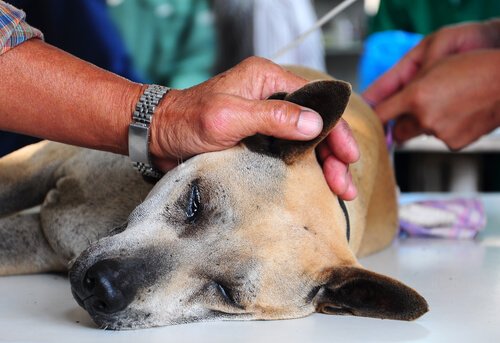Itchy Ears in Dogs

There are plenty of reasons why a dog might scratch his ears. It’s very common and unpleasant, and there could be more to it than just an itch.
Don’t be ashamed of having your vet checking if your dog is sick because that is his/her job. So, if your dog is scratching his ears, go see one right away. They have the tools to determine what’s wrong, and to sedate your pet if necessary.
It’s not always easy to examine pets because some don’t stay still. In today’s article you can find out some of the causes for itchy ears in dogs. No matter, it’s always best to get a vet’s opinion.
Parasites
The most common, itchiest parasites for dogs are fleas, mites, and ticks. They can easily find their way onto their skin or fur because they are easily spread through contact. They also live outdoors (in the soil or on plants), so they are just waiting for an opportunity to infest an animal.

A detailed examination of your dog’s ears and fur is the best way to see if he has any parasites. Of course this only works for visible parasites, there are also others that can’t be seen with the naked eye.
Unless it’s a bad infestation, you can get rid of them safely and easily with common chemical disinfectants.
You can also use anti-flea collars, give your dog baths, and do occasional injections to prevent an infection.

Fungi
There are thousands of fungi that might attack your dog’s skin and fur, and they love humidity and heat. The most common fungus of all is the one that causes ringworm.
It causes burning, itchy ears, irritation or changes to the skin, and hair loss. If you notice these symptoms, take your dog to the vet to get the correct diagnosis and a prescription to treat it properly.
Otitis and other infections
The cause of the itch might not be visible due to your dog having an ear infection known as otitis. Pay attention to your dog to see if he reacts differently from scratching himself. Keep an eye out for head shaking, head scraping, loss of balance, secretions from the ear, or swelling.

Otitis and other infections can become much more serious. So always take your dog to the vet as soon as possible to make sure it gets antibiotics.
Foreign objects
Another reason why dogs get itchy ears is due to putting objects into their ear canals. It’s not unusual for them to accidentally put things stuck in their ears such as leaves, seeds, rocks, twigs, pins, or other small objects. Only medical professionals are equipped to examine and remove them.
Food allergies
Food allergies can have a lot of different symptoms. One of them is itchiness on several parts of a dog’s body, especially his ears. When he scratches himself, he may cause irritation and more itchiness, which is a bad habit that prevents him from getting better, whether it being a medical condition or just a symptom.

This is another reason why a vet should be the one in charge in figuring out what’s causing the itching and how to get your dog back to full health.
Myths about allergies in dogs
Look at the following myths about itchy ears and some diseases in dogs:
- The following things aren’t contagious to humans.
- These things could happen to any dog. They have nothing to do with hygiene or a breed. Purebred dogs, mutts, and strays are all just as likely to get these medical issues. The only thing that plays a role is whether a dog has been predisposed since it was a puppy.
- If you have other animals at home, take the exact same preventative measures with them in case of something contagious.
- Follow the vet’s orders. Always remember that even if it seems like the problem has gone away. If there actually was a disease it might come right back.
